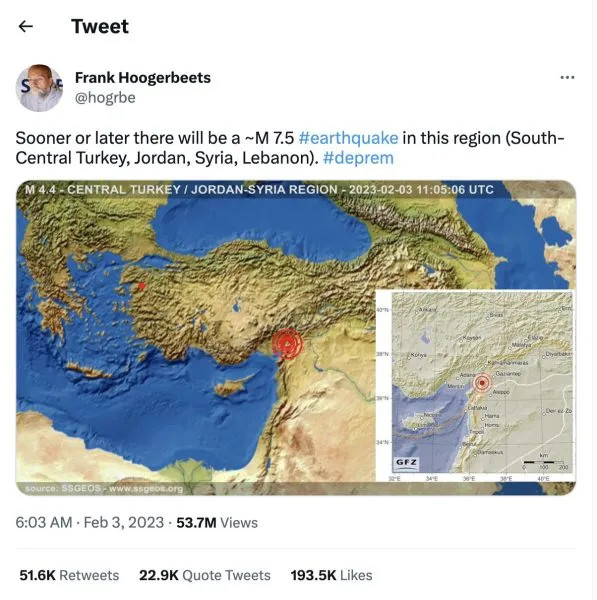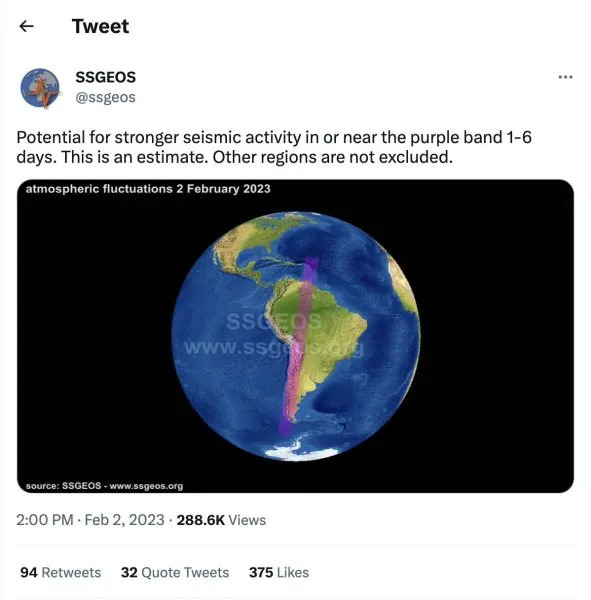By Matthew J.L. Ehret
Matt Ehret's Insights
February 15, 2023
[ originally published on The Last American Vagabond]
"Can we forecast earthquakes? No. Neither the United States Geology Survey (USGS) nor any other scientists have ever predicted a major earthquake. We do not know how, and we do not expect to know how any time in the foreseeable future."
-United States Geology Survey website
On the morning of February 6, 2023 the people of Turkey and Syria were struck by a devastating 7.8 magnitude earthquake, followed by a 6.7 aftershock and then a final (we hope) 7.5 M quake in the late afternoon. The effects of the three-fold quake struck deep into Syria and as of this writing, over 23,000 deaths, and 500,000 injured have been counted in Turkey and Syria, along with tens of thousands of injuries and incredible destruction to infrastructure.
Were it not for the political obfuscation that has derailed all fields of science over the past decades, then this tragic loss of life would have been entirely preventable.
How?
Because despite the clamorings of the priests of standard model geology managing the US Geological Survey, the fact is that earthquakes are completely forecastable.
Take the singular case of Dutch scientist Frank Hoogerbeets, representing the self-funded Solar System Geometry Survey (SSGEOS) who published the following tweet a full three days prior to the February 6th disaster:

Reflecting on the method he and other like-minded scientists use within the international forecasting community, Hoogerbeets explained:
"As I stated earlier...this would happen in this region, similar to the years 115 and 526. These earthquakes are always preceded by critical planetary geometry, as we had on the fourth-fifth of February"
What sort of "planetary geometries" is Hoogerbeets talking about?
It isn't that Hoogerbeets uses a crystal ball, believes in astrology or has better data than the scientists of the US Geographical Survey, but rather that he is simply a real scientist who doesn't believe in dogmatic procedures masquerading as "science" if they don't actually work. His method of looking at "planetary geometries" as an important component to his success was laid out in a three minute introductory video Earthquakes and Electro Magnetic Waves:
odysee.comIt should also be noted that this was not Hoogerbeets' first successful forecast.
On February 2, 2023, the SSGEOS published that there was "potential for stronger seismic activity in or near the purple band (indicating the east side of South America) in 1-6 days." This warning was followed by a February 5, 2023 5.6 magnitude earthquake that struck Cuiquimbo Chile.
On January 29, 2023, SSGEOS predicted stronger seismic activity in an area which he outlined on a map as southern China and northern India. This was followed within a day by a 5.8 magnitude earthquake that hit southern Xinjiang.

Since setting up the SSGEOS in 2014, Hoogerbeets and his team have made hundreds of successful forecasts which stand in loud contrast to their mainstream rivals whose commitment to statistical probability theory, and linear computer modeling have resulted in dismal failure consistently for decades.
What sets Hoogerbeets apart from the statisticians who have come to dominate the field of seismology is simply his emphasis upon the electro-magnetic, chemical, and galactic properties of earth's dynamics.
Unlike the modern "seismologists" who assert that everyone must adhere to the absurd "elastic rebound theory", which presupposes the sole cause of earthquakes is located within tectonic plates and gravitational forces, those scientists who make successful predictions in this contentious field choose instead to focus on the electromagnetic properties of the earth and broader solar system (and galaxy) shaping the earth's environment.